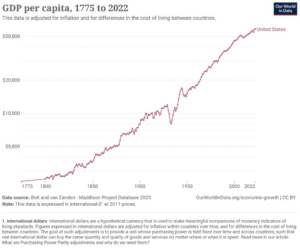James Hartley – inspired by Rainer Zitelmann – offers sound advice for ending poverty.
Arnold Kling reflects insightfully on Chicago economics, Austrian economics, and Kling-economics. A slice:
I like to talk about the three e’s: experimentation, evaluation, and evolution. A good economic system conducts many experiments. Experiments are evaluated rigorously. And evolution leads to the retention of what works and the discarding of what fails. So if a lot of business initiatives are tried, and they are evaluated by the price system, and then profits and losses drive evolution, that will result in dynamic efficiency.
The Editorial Board of the Wall Street Journal explains how the U.S. Supreme Court is restraining Trump. Two slices:
Sometimes we have to marvel at the cognitive dissonance of our progressive friends. They shout with alarm that the Supreme Court’s decision this week on presidential immunity has removed all legal restraints on a future Trump Presidency. Then they lambaste the Court for curbing the power of the executive branch. Who’s on first?
…..
Progressives rightly fret that Loper could put other Biden rules in legal jeopardy—for instance, the Securities and Exchange Commission’s climate disclosures and Food and Drug Administration’s classification of lab-developed tests as medical devices. Regulators will now have a harder time stretching laws to expand their power.
This includes future Trump regulators. Judges will have more leeway to block Trump immigration actions. And Trump appointees will have a harder time rewriting the law without Congressional legislation, such as regulating the proxy advisory duopoly. This is a check on willful presidential power.
The demise of Chevron could even empower Democrats in Congress since a future Trump Administration would have to negotiate with them to pass legislation. Most of the Trump agenda can’t be enacted by a Republican majority through budget reconciliation.
Scott Lincicome continues to write insightfully about trade. A slice:
There are surely many reasons for this glaring omission, beyond simply the age of our political candidates and the sclerosis that infects much of our policy. Among those reasons is that digital trade challenges the conventional wisdom about globalization in several important ways that today’s politicians might not appreciate. Americans, so we’re told, have embraced protectionism, yet—as Kevin Williamson noted last week—we all joyfully and regularly consume loads of digital “content” from all over the world and do so with little concern for its origins or means of delivery. Kevin is also surely correct that Americans would “riot” (figuratively, I think) if the U.S. government suddenly started interfering in our content consumption habits to protect, say, some random pundits or gamers or Victorian cosplayers in Milwaukee. We really like this stuff, as the eight-fold increase in “audiovisual services imports” (aka stuff like Squid Game and The Great British Bake Off) between 2010 and 2021 demonstrates. It’s undoubtedly increased even more since then.
Pierre Lemieux explores the meaning of “to govern.”




